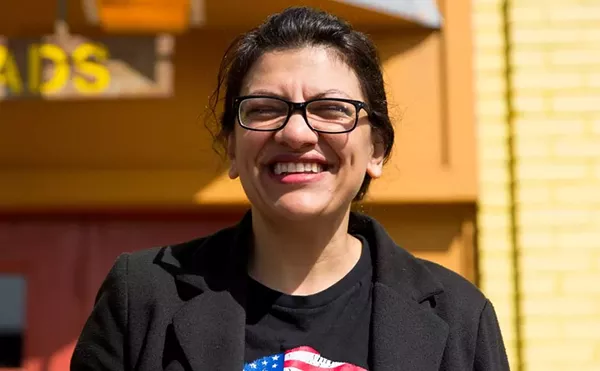The colorful biking jerseys advertising riders' affiliations with the International Mountain Biking Association and the League of Michigan Bikers were to be expected, but what was the leader of Detroit's Coalition Against Police Brutality doing among a group of two-wheelers?
Biking is a social justice issue in Detroit, don't you know. That's what brought Ron Scott, the coalition president, and a few dozen other riders and support crew out last week for a demonstration ride through downtown.
Plus it was just a darn nice day to burn calories instead of fossil fuel, tour the neighborhoods located on the route between Eastern Market and Hart Plaza, and hang out with riders with shared passions. They couldn't help themselves from busting out the fancy mountain and road bikes as well as bikes with milk crates attached (useful for hauling groceries), choppers and cruisers with bells on the handlebars.
It was news of the Detroit Police Department's planned enforcement of the city's bicycling ordinance that linked pedalers and social activists this summer. The 1964 ordinance called for the mandatory registration of bicycles, with noncompliance drawing a $55 ticket if cyclists were stopped.
"We saw that issue as a police brutality issue," Scott says. The opportunity a cyclist presented to police for ticketing could have led to unreasonable searches and seizures. "It became an issue of whether people could engage in something ... without it becoming punitive," Scott says.
Scott and others — he calls them "self-propelled activists" — protested and attended a Detroit City Council meeting last month. Council members voted to repeal the ordinance, changing the agenda of last week's ride.
"Originally it was going to be a protest and now it's a celebration," says Todd Scott, no relation to Ron Scott, who is the Detroit Greenways coordinator at the Michigan Trails and Greenway Alliance. "It will continue to raise the profile of biking in the city of Detroit."
Promoting cycling in general has become part of a broader agenda for social consciousness, both Scotts say, because of the sport's environmental, health and community-building abilities. Second-hand bicycles can be purchased cheaply. Pushing pedals is free. Using a bicycle saves on fossil fuels. As people ride, they meet each other and their neighbors. They make a more seamless connection between their homes and surrounding neighborhoods when they're moving at pedal pace and not separated by car windows.
Detroiter Harriet Saperstein is happy it's finally taking hold. As a planner in the city's recreation department in the 1970s, she dreamed of a waterfront bike route that would lure people to two-wheeled exercise, family time and entertainment in the city. Last week she took her 14-year-old granddaughter and a friend on the route and rode with the Scotts.
"It's a shame we had to wait so long for this," she said. "The more people that are biking, the safer it is."
News Hits is edited by Curt Guyette. Contact him at 313-202-8004 or [email protected]





